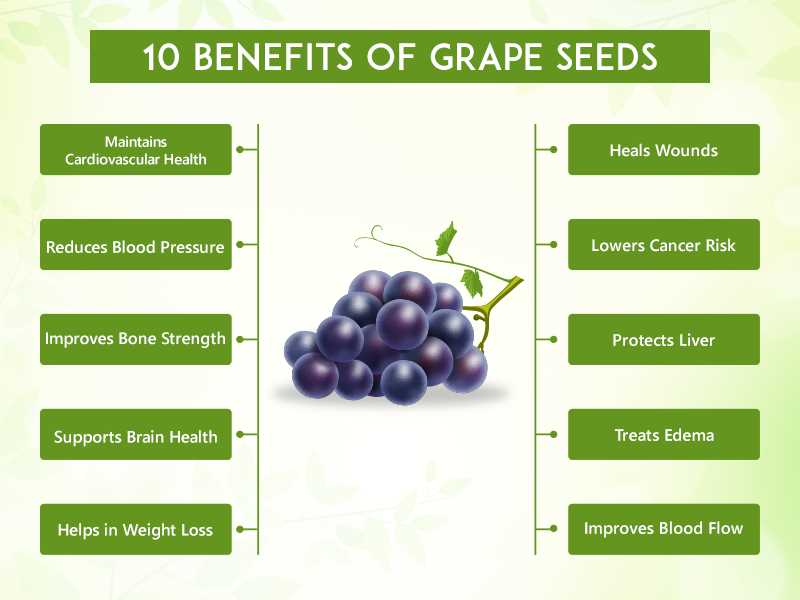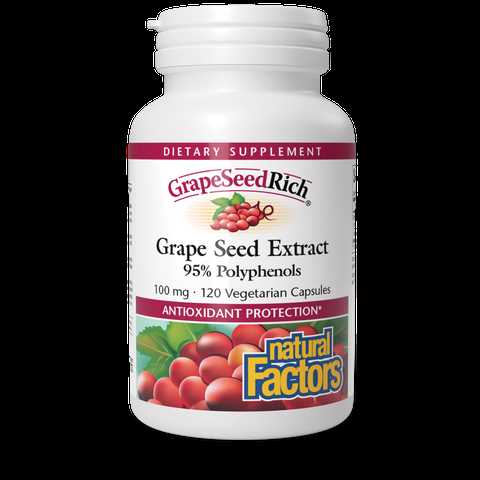- Why Grapes are Good for You
- Improve Heart Health
- 1. Antioxidant Properties
- 2. Lower Blood Pressure
- 3. Improve Cholesterol Levels
- 4. Reduce Blood Clotting
- 5. Boost Nitric Oxide Production
- 6. Support Heart Muscle Function
- Boost Immune System
- Protect Against Cancer
- Enhance Digestion
- Promote Weight Loss
- Maintain Healthy Skin
- Antioxidant-rich
- Moisturizing properties
- Anti-inflammatory effects
- Improves skin elasticity
- Protects against UV damage
- Recommendations
- Prevent Eye Diseases
- Support Brain Function
- Question-answer:
- What are the health benefits of grape leaves?
- What are the benefits of grape fruits?
- How can grape seeds be beneficial for health?
- Are there any specific health benefits of red grapes?
- Do green grapes have the same health benefits as red grapes?
- Can consuming grapes help with weight loss?
- Video: 7 Reasons You Should Eat Grape Seeds
Grapes, known botanically as Vitis vinifera, are not only deliciously sweet, but they also offer a wide range of health benefits. While most people are familiar with the nutritional value of the grape fruit itself, many are unaware of the additional health benefits that can be derived from other parts of the grape plant. This article will explore how the leaves, fruits, and seeds of grapes can be used to extract various health benefits.
The leaves of grape plants have long been used in traditional medicine for their therapeutic properties. Packed with antioxidants, flavonoids, and vitamins, grape leaves have been found to have anti-inflammatory, anti-cancer, and cardiovascular benefits. They can be brewed into a tea or used as an ingredient in various dishes to enhance the flavor and reap their health benefits.
When it comes to the fruits, grapes are rich in vitamins C and K, as well as antioxidants like resveratrol. These nutrients have been shown to support a healthy immune system, promote cardiovascular health, and contribute to healthy skin. Grapes can be enjoyed fresh, juiced, or made into jams and jellies, allowing you to easily incorporate them into your diet and take advantage of their health benefits.
The seeds of grapes are another part of the plant that can be utilized for their health benefits. Grape seed extract, a powerful antioxidant, has been linked to improved skin health and protection against oxidative stress. Additionally, grape seed oil, which is extracted from the seeds, can be used for cooking and has been found to have anti-inflammatory and heart-healthy properties.
Note: It is important to consult with a healthcare professional or a registered dietitian before adding new supplements or making major dietary changes. While grapes have many health benefits, individual needs and health conditions may vary.
In conclusion, the versatile grape plant offers more than just a tasty fruit. Its leaves, fruits, and seeds provide a myriad of health benefits, from fighting inflammation and supporting cardiovascular health to promoting healthy skin. By incorporating grapes into your diet, you can harness the power of these natural remedies and improve your overall well-being.
Why Grapes are Good for You
- Rich in Antioxidants: Grapes contain a variety of antioxidants, such as resveratrol, flavonoids, and anthocyanins. These antioxidants help protect your cells from damage caused by free radicals and may reduce the risk of chronic diseases.
- Heart-Healthy: The antioxidants found in grapes are particularly beneficial for heart health. They can help lower blood pressure, reduce cholesterol levels, and prevent the formation of blood clots. Consuming grapes regularly may help improve cardiovascular health.
- Boost Immune System: Grapes are a good source of vitamin C, which is known to boost the immune system. Vitamin C helps stimulate the production of white blood cells, which are essential for fighting off infections and diseases.
- Improve Brain Function: Resveratrol, a compound found in grapes, has been shown to improve brain function and protect against neurodegenerative diseases, such as Alzheimer’s and Parkinson’s. Including grapes in your diet may help promote better cognitive function and memory.
- Support Digestive Health: Grapes are high in fiber, which can promote healthy digestion. Fiber helps regulate bowel movements, prevents constipation, and supports overall gut health.
- Anti-Inflammatory Properties: Certain compounds in grapes have anti-inflammatory effects, which can help reduce inflammation in the body. Chronic inflammation is linked to various diseases, including heart disease, cancer, and arthritis.
- Weight Management: Grapes are low in calories and high in water content, making them a good choice for weight management. They can help you feel full and satisfied without consuming excessive calories.
Incorporating grapes into your diet can provide numerous health benefits. Whether enjoyed as a snack, added to salads, or used in cooking, grapes make a delicious and nutritious addition to any meal.
Improve Heart Health
Grapes are a heart-healthy food that offer a variety of benefits for cardiovascular health. Here are some ways in which grapes can help improve heart health:
1. Antioxidant Properties
Grapes contain powerful antioxidants, such as resveratrol and flavonoids, which help protect the heart from damage caused by free radicals. These antioxidants can reduce inflammation and prevent the oxidation of cholesterol, which can lead to the formation of plaque in the arteries.
2. Lower Blood Pressure
The high potassium content in grapes can help lower blood pressure levels. Potassium helps relax blood vessels, promoting better blood flow and reducing the strain on the heart.
3. Improve Cholesterol Levels
Grapes can help improve cholesterol levels by increasing good cholesterol (HDL) and reducing bad cholesterol (LDL) levels.
4. Reduce Blood Clotting
The antioxidants and anti-inflammatory compounds in grapes have been shown to reduce the risk of blood clot formation, which can lead to heart attacks or stroke.
5. Boost Nitric Oxide Production
Grapes contain high levels of nitric oxide, a compound that helps relax blood vessels and improve overall blood flow. This can promote better oxygen and nutrient delivery to the heart.
6. Support Heart Muscle Function
Grapes contain natural compounds that can support the health and function of the heart muscle. This can help improve overall heart function and reduce the risk of heart disease.
It’s important to note that while grapes can offer these heart health benefits, they should be consumed as part of a balanced diet and a healthy lifestyle. Incorporating grapes into a diet rich in fruits, vegetables, whole grains, and lean proteins can help support cardiovascular health.
Boost Immune System
Grapes are a great addition to your diet to boost your immune system. They are rich in antioxidants, vitamins, and minerals that help strengthen your immune system and protect your body against harmful pathogens.
1. Vitamin C: Grapes are a good source of vitamin C, which is known for its immune-boosting properties. Vitamin C helps stimulate the production of white blood cells, which are responsible for fighting infections and diseases.
2. Resveratrol: Grapes contain resveratrol, a powerful antioxidant that has been linked to immune-boosting effects. Studies have shown that resveratrol can enhance the activity of immune cells and reduce inflammation in the body.
3. Antioxidants: Grapes are packed with antioxidants, such as flavonoids and polyphenols, which help protect your cells from damage caused by free radicals. By preventing cell damage, antioxidants support a healthy immune system.
- Flavonoids: Flavonoids, such as quercetin and catechins, are found in grapes and have strong antioxidant effects. They help to reduce inflammation and support immune function.
- Polyphenols: Polyphenols, including stilbenes and anthocyanins, are also present in grapes and contribute to their immune-boosting properties. These compounds have been shown to improve immune response and protect against infections.
4. Fiber: Grapes are a good source of dietary fiber, which plays a crucial role in maintaining a healthy immune system. Fiber helps support the growth of beneficial gut bacteria, which are important for immune function.
5. Hydration: Grapes have a high water content, which helps keep your body hydrated. Proper hydration is essential for a healthy immune system as it allows your body to effectively transport nutrients and remove toxins.
By including grapes in your diet, you can provide your body with essential nutrients and antioxidants that can strengthen your immune system and improve your overall health.
Protect Against Cancer
Grapes are known for their potential to protect against cancer. They contain various compounds that have been shown to have anticancer properties, including resveratrol, quercetin, and catechins.
Resveratrol: This compound has been widely studied for its ability to inhibit the growth of cancer cells and prevent the formation of tumors. It can also enhance the effectiveness of chemotherapy and reduce side effects.
Quercetin: Quercetin is a flavonoid that has been found to have powerful antioxidant properties. It can help reduce oxidative stress and inflammation, which are known to contribute to the development of cancer.
Catechins: Catechins are a type of flavonoid that are abundant in grapes. They have been shown to inhibit the growth of cancer cells and induce apoptosis, or programmed cell death.
The combination of these compounds in grapes makes them a potent antioxidant, anti-inflammatory, and anticancer food. Consuming grapes regularly can help protect against various types of cancer, including lung, prostate, colon, and breast cancer.
To maximize the cancer-fighting benefits of grapes, it is recommended to consume them in their whole form, including the skin and seeds. These parts of the grape contain high levels of the beneficial compounds.
Enhance Digestion

Grapes are known to be beneficial for digestion due to their high fiber content. Fiber helps to regulate bowel movements and prevent constipation. Consuming grapes regularly can help to improve digestion and prevent digestive disorders such as bloating, gas, and indigestion.
In addition to fiber, grapes also contain enzymes that aid in the digestion and breakdown of proteins, fats, and carbohydrates. These enzymes help to promote the proper digestion and absorption of nutrients from the food we eat.
Furthermore, grapes are a good source of water, which can help to hydrate the body and aid in the digestion process. Staying properly hydrated is important for maintaining a healthy digestive system.
Promote Weight Loss

One of the benefits of grapes is their ability to promote weight loss. Grapes are low in calories and high in fiber, making them a great snack option for those who are trying to lose weight. The high water content in grapes helps to keep you hydrated and feeling full, reducing the temptation to snack on unhealthy foods.
In addition to being low in calories, grapes also contain a compound called resveratrol, which has been shown to aid in weight loss. Resveratrol has been found to increase the metabolism and reduce the formation of fat cells, making it easier to shed those extra pounds.
Grapes are also a good source of vitamins and minerals, including vitamin C, vitamin K, and potassium. These nutrients can help to support a healthy metabolism and promote weight loss.
One way to incorporate grapes into your weight loss plan is to include them in your salads or as a snack between meals. You can also try adding grape juice or grape seed oil to your recipes for an extra boost of flavor and health benefits.
Overall, grapes are a delicious and nutritious food that can help you on your weight loss journey. By including them in your diet, you can enjoy their sweet taste while also reaping the benefits of their weight loss properties.
Maintain Healthy Skin
Grapes are not only delicious, but they also offer numerous benefits for maintaining healthy skin. Whether you consume grapes, grape leaves, or grape seed oil, you can expect improvements in your skin’s appearance and health.
Antioxidant-rich
Grapes are packed with antioxidants, such as vitamin C and resveratrol, which help protect the skin from damage caused by free radicals. Free radicals can contribute to premature aging, wrinkles, and other skin issues.
Moisturizing properties

Grapes contain natural moisturizing properties that can hydrate the skin. Grape seed oil is often used in skincare products due to its ability to lock in moisture and keep the skin well-hydrated.
Anti-inflammatory effects
The antioxidants found in grapes also have anti-inflammatory effects, which can help calm and soothe irritated and inflamed skin. This makes grapes a great option for individuals with sensitive or acne-prone skin.
Improves skin elasticity
Grapes are rich in collagen and elastin, two proteins that are crucial for maintaining skin elasticity. By consuming grapes or using grape-based skincare products, you can promote the production of these proteins, resulting in firmer and more youthful-looking skin.
Protects against UV damage
The resveratrol found in grapes has been shown to protect the skin from the damaging effects of UV radiation. While it is important to still use sunscreen, incorporating grapes into your diet or skincare routine can provide additional protection against sun damage.
Recommendations
To enhance the health of your skin, consider incorporating grapes into your diet. You can snack on fresh grapes, add them to salads, or even make grape juice. Additionally, look for skincare products that contain grape seed oil or grape extracts to maximize the benefits for your skin.
Prevent Eye Diseases
Grapes contain different antioxidants that can help prevent eye diseases and promote good eye health.
1. Antioxidants: Grapes are rich in antioxidants like flavonoids, resveratrol, and lutein, which help protect the cells in the eyes from damage caused by free radicals. Free radicals can lead to macular degeneration, cataracts, and other eye diseases.
2. Macular Degeneration: The antioxidants in grapes, especially lutein, play a crucial role in preventing age-related macular degeneration. This condition causes a gradual loss of vision and is one of the leading causes of blindness in older adults.
3. Cataracts: Cataracts occur when the lens of the eye becomes cloudy, leading to blurry vision. The antioxidants in grapes help reduce the oxidative stress that can contribute to the development of cataracts.
4. Eye Strain: Grapes also contain resveratrol, which has anti-inflammatory properties. This can help reduce eye strain caused by prolonged use of digital devices, reading, or other activities that require intense focus on close objects.
Overall, incorporating grapes into your diet can help protect your eyes from various diseases and promote good eye health. Remember to consult with a healthcare professional if you have any specific concerns about your eye health.
Support Brain Function
Consuming grapes has been shown to have beneficial effects on brain function.
1. Cognitive Function:
- Grapes are rich in antioxidants, which help protect the brain from oxidative stress and inflammation, improving cognitive function and memory.
- Resveratrol, a compound found in grape skins, has been found to enhance memory and learning ability in studies involving animals.
2. Neuroprotective Effects:
- The antioxidants in grapes help reduce oxidative stress, which can cause damage to brain cells and increase the risk of neurodegenerative diseases, such as Alzheimer’s and Parkinson’s disease.
- Grapes also contain polyphenols, which have been shown to have neuroprotective properties and may help prevent the progression of age-related cognitive decline.
3. Blood Flow:
- Grapes contain flavonoids, such as quercetin and resveratrol, which can improve blood flow to the brain, enhancing oxygen and nutrient delivery, and promoting overall brain health.
4. Anti-Inflammatory Properties:
- Inflammation is associated with brain aging and neurodegenerative diseases. Grapes and grape extracts have been shown to have anti-inflammatory effects, reducing inflammation in the brain and protecting against cognitive decline.
Eating grapes regularly, including their leaves, fruits, and seeds, can provide numerous health benefits for brain function and overall cognitive health.
Question-answer:
What are the health benefits of grape leaves?
Grape leaves have several health benefits. They are rich in antioxidants, which can help prevent cell damage caused by free radicals. They also contain compounds that have anti-inflammatory properties and can help reduce inflammation in the body. Grape leaves are also believed to have potential cancer-fighting properties and can help regulate blood sugar levels.
What are the benefits of grape fruits?
Grape fruits are packed with vitamins and minerals that are beneficial for your health. They are a good source of vitamin C, which can boost your immune system and help protect against common illnesses. Grape fruits also contain antioxidants that can help reduce the risk of heart disease and certain types of cancer. They are also low in calories and high in fiber, making them a great addition to a healthy diet.
How can grape seeds be beneficial for health?
Grape seeds are rich in antioxidants, particularly a compound called proanthocyanidin. These antioxidants can help protect the body’s cells from damage caused by free radicals, which can lead to various health issues. Grape seeds are also believed to have anti-inflammatory properties and may help reduce inflammation in the body. Additionally, they have been associated with improved cardiovascular health and may help lower blood pressure levels.
Are there any specific health benefits of red grapes?
Red grapes have several specific health benefits. They are a rich source of resveratrol, a compound that has been associated with a reduced risk of heart disease. Red grapes also contain anthocyanins, which are pigments that give them their color and have been linked to improved brain function. Additionally, red grapes can help lower cholesterol levels and may contribute to better digestion.
Do green grapes have the same health benefits as red grapes?
While green grapes may not have the same specific health benefits as red grapes, they are still a nutritious fruit. Green grapes are a good source of vitamins C and K and contain antioxidants that can help protect against oxidative stress. They also have a high water content and can help keep you hydrated. Green grapes have a mild laxative effect and may aid in digestion as well.
Can consuming grapes help with weight loss?
When consumed as part of a balanced diet, grapes can support weight loss. Grapes are low in calories and high in fiber, which can help you feel full and satisfied. They can also satisfy your sweet tooth without consuming high-calorie and high-sugar snacks. However, it is important to eat grapes in moderation as part of an overall healthy eating plan.







